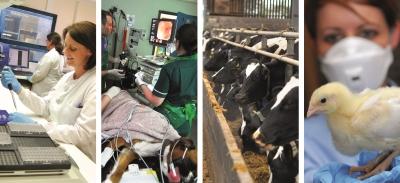Dick Vet and Roslin staff head for India
Animal health and welfare experts from Edinburgh are taking part in an international conference in Bangalore.

The five-day event, which is being organised jointly by the University, will look at ways to improve the quality of life for both livestock and pets, as well as diseases threatening India’s wildlife.
Topics for discussion include new techniques to address infectious diseases in herd animals; finding new ways to tackle India’s growing problem of rabid dogs; and examining treatments for other zoonotic diseases - those affecting both humans and animals.
“Advances in Veterinary Research: Impact and Opportunities” opens on 19 February and includes a public lecture on the subject of genetically-engineered livestock.
The improvement of animal health and, by association, human health in India is a pressing concern, especially with the numbers of domestic and livestock animals set to rise significantly in the coming years. My colleagues and I want to learn from India’s experience and use our expertise to help tackle a diverse range of animal diseases and welfare issues.
Working together
The conference is a collaborative event between the University of Edinburgh’s Royal (Dick) School of Veterinary Studies and the Commonwealth Veterinary Association; Karnataka Veterinary, Animal and Fisheries Sciences University, Bidar; and the National Institute of Animal Nutrition and Physiology, Bangalore.
India is a tremendously important country for the University of Edinburgh. The quality of the students who apply to us is very high and the numbers wishing to study at Edinburgh continues to rise. This conference will allow discussion of crucially important issues that affect India and the wider world and I look forward to valuable partnerships being established between Edinburgh and our friends in India.
Online learning for all
Conference delegates will also hear about Edinburgh’s use of technology to provide distance-learning opportunities for around the world.
In addition to a large number of postgraduate courses, Edinburgh has pioneered the provision of Massive Open Online Courses (MOOCs). These free online courses are available to anyone. Typically lasting six weeks, Edinburgh’s MOOCs include courses such as “Animal Behaviour and Welfare” and “The Discovery of the Higgs boson”.
To date, more than 600,000 people have enrolled for Edinburgh’s MOOCs.
Working with India
Edinburgh has a long history of collaboration with Indian universities and research institutes. In 1875 the Indian Association, the first South Asian Student Association ever in the United Kingdom was founded at Edinburgh and the following year saw the first Indian student graduate from the University.
Over the past few decades Edinburgh’s relationship with India has grown and strengthened and this year the University has almost 250 Indian students enrolled- more than twice as many as 5 years ago.
In 2013, the University launched the Edinburgh India Institute. This provides a focal point to collate all research and cultural links between Edinburgh and India. Activities in 2013 included hosting a visit from students with disabilities from Delhi University and sending a group of over 80 Edinburgh students on the College on Wheels project across northern India.
The University’s India office, based in Mumbai, provides a local liaison point for Edinburgh’s activities across the country.
Related Links
The Royal (Dick) School of Veterinary Studies
The Jeanne Marchig International Centre for Animal Welfare Education
The University of Edinburgh Coursera MOOCs
Postgraduate Study at the Royal (Dick) School of Veterinary Studies
The Commonwealth Veterinary Association
Karnataka Veterinary, Animal and Fisheries Sciences University


